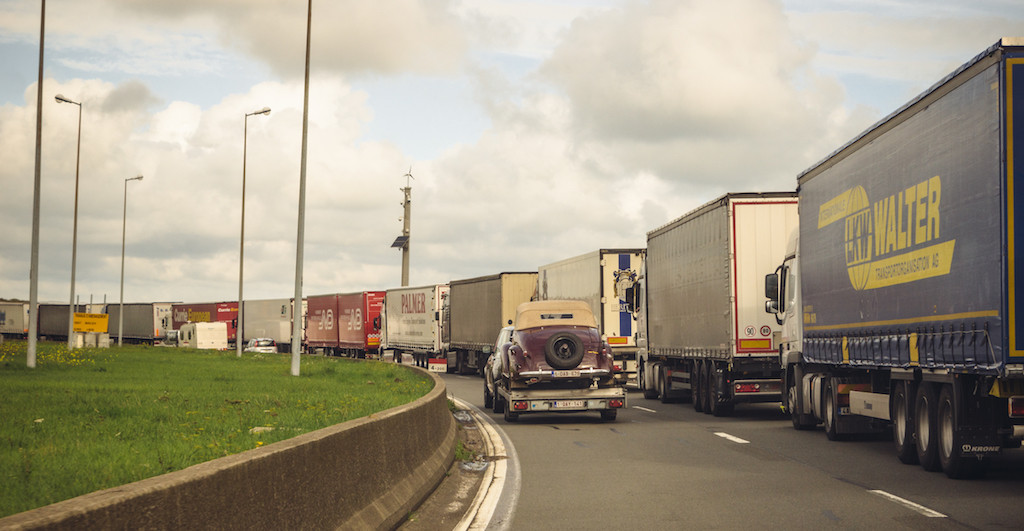European Union capitals are ramping up their preparations to minimise the chaos and disruption of a possible no-deal Brexit after Theresa May’s plan was crushed by MPs.
With 72 days until the UK is due to leave the EU, the Belgian prime minister, Charles Michel, met cabinet ministers on Tuesday to discuss their top priorities for a package of emergency Brexit laws that he wants to present to parliament before the end of February.
The Belgian government has told businesses and citizens that a no-deal Brexit could lead to the imposition of up to €2.2bn (£1.96bn) in extra tariffs on goods and the loss of more than 40,000 jobs.
In France, which has already passed its no-deal contingency legislation, the Europe minister, Nathalie Loiseau, stressed that no further concessions could be expected from the bloc.
“It’s up to the British parliament and the British government to have a back-up plan in case,” Loiseau told reporters at the European parliament in Brussels. “It’s no longer up to us – we have given everything we can give.”
The Spanish government this week launched an online information service for citizens and businesses, including advice on how to prepare for a no-deal Brexit, which the foreign minister, Josep Borrell, called “a disaster for everyone”.
Madrid has drafted a decree enabling it to enact no-deal contingency provisions drawn up by the European commission.
The EU’s executive last month unveiled bare-bones plans to keep planes in the air and money flowing should the UK crash out, saying it would take all necessary steps to limit the fallout from the ensuing disruption for its members.
A temporary nine-month regime would allow UK airlines to fly to the continent and back (but not between EU cities), EU banks to clear transactions in the City of London, British trucks to deliver goods into the EU, and vital data to be shared. The bloc can terminate this regime unilaterally.
Be generous in protecting basic rights
The EU’s executive arm urged governments to be generous in protecting basic rights for the 1.3 million Britons living in member states by granting temporary residence permits while they resolved their long-term status.
Several, including the Netherlands, Portugal, Poland and the Czech Republic, have done so, with others – including Austria and Sweden – announcing this week that they now planned to rush through similar measures as part of omnibus laws.
No-deal preparations are most advanced in member states that would be the most severely affected, such as Ireland, France, the Netherlands and Belgium. Dublin last month published its no deal plans, conceding that they were at best “a damage-limitation exercise”, and on Tuesday put forward a 17-part, omnibus bill to speed through no-deal contingency laws on everything from health to tax and justice.
Like most EU countries trading extensively with the UK, Ireland is hiring extra staff – 1,000 in its case – for customs controls, sanitary and phytosanitary checks and export certification. It is also acquiring land near Dublin and Rosslare ports for border inspection bays, truck parks and offices.
Last month, Paris passed no-deal legislation that would keep people and freight moving between France and Britain and allow the government to pass emergency laws by decree if necessary to “stabilise” travel, residence, work and welfare issues for British citizens in France.
French authorities are hiring an extra 700 customs officers, expanding border control infrastructure, such as checkpoints, roads and lorry parks, and building new warehousing in Calais, Cherbourg and at the entrance to the Channel tunnel.
Additional customs officials
Germany is hiring an additional 900 customs officials to help ensure the smooth passage of goods, and has passed laws ensuring a limited number of euro financial products – including insurance – will be covered by the EU’s existing passporting regime in the event of no deal.
The Netherlands, home to Europe’s largest port in Rotterdam, aims to have hired more than 900 extra customs officials by the end of the year – one-third of them by the time Britain plans to leave the EU on 29 March – as well as 150 vets and other scientists for checks on food, plant and animal products.
Along with the Belgians, French and Danish, the Dutch have launched comprehensive Brexit impact assessment schemes allowing companies to analyse their specific no-deal risks based on business sector and relationship with the UK.
The Irish and Dutch governments are so concerned about the possible impact on businesses that they are offering cash grants and vouchers to companies with a particular exposure to the UK, either to pay for specialist advice or to help them look for new markets.
Sweden has identified a dozen or so sectors where the consequences of a no-deal Brexit could be “immediate and serious”, the country’s EU minister, Ann Linde, said last week.
By Jon Henley, European affairs correspondent
